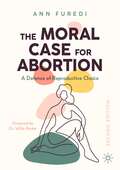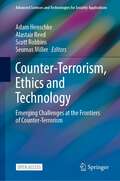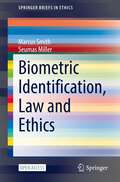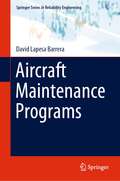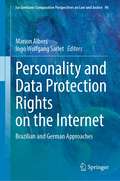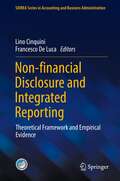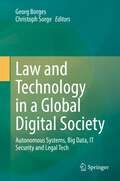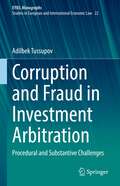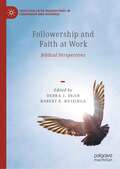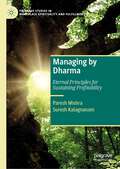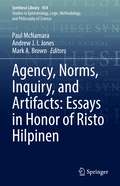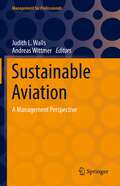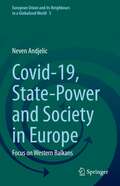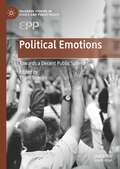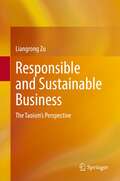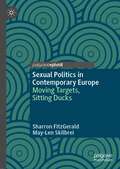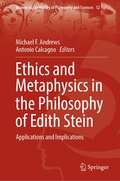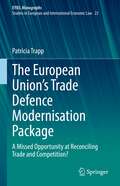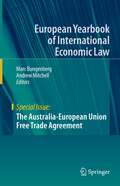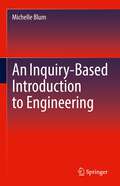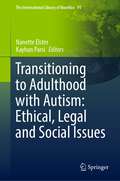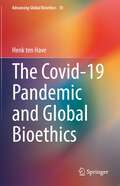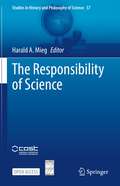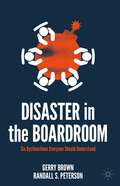- Table View
- List View
The Moral Case for Abortion: A Defence of Reproductive Choice
by Ann FurediThis revised and updated edition of the 2016 bestselling work sets out the moral arguments for a woman’s right to decide the future of her pregnancy. Drawing on traditions of philosophical and sociological thinking, it presents the case for recognizing autonomy in personal, private decision-making about reproductive intentions. Further, it argues that to prevent a woman making this decision according to her own values is to undermine the essence of her humanity. The author explores how true respect for human life and regard for individual conscience demands that we support a woman’s right to decide, and that support for her right to terminate her pregnancy has moral foundations and ethical integrity. This second edition features a foreword by US abortion provider and reproductive justice advocate Dr. Willie Parker, as well as additional chapters that consider the rights of doctors and nurses to withdraw from abortion provision on grounds of conscience. Furedi also surveys the rapidly changing landscape of the abortion debate, including the rights of women in the aftermath of Trump's presidency; debates, politics and religion in Northern Ireland and the Republic of Ireland; and the differing levels of provision across Europe.
Counter-Terrorism, Ethics and Technology: Emerging Challenges at the Frontiers of Counter-Terrorism (Advanced Sciences and Technologies for Security Applications)
by Seumas Miller Adam Henschke Alastair Reed Scott RobbinsThis open access book brings together a range of contributions that seek to explore the ethical issues arising from the overlap between counter-terrorism, ethics, and technologies. Terrorism and our responses pose some of the most significant ethical challenges to states and people. At the same time, we are becoming increasingly aware of the ethical implications of new and emerging technologies. Whether it is the use of remote weapons like drones as part of counter-terrorism strategies, the application of surveillance technologies to monitor and respond to terrorist activities, or counterintelligence agencies use of machine learning to detect suspicious behavior and hacking computers to gain access to encrypted data, technologies play a significant role in modern counter-terrorism. However, each of these technologies carries with them a range of ethical issues and challenges. How we use these technologies and the policies that govern them have broader impact beyond just the identification and response to terrorist activities. As we are seeing with China, the need to respond to domestic terrorism is one of the justifications for their rollout of the “social credit system.” Counter-terrorism technologies can easily succumb to mission creep, where a technology’s exceptional application becomes normalized and rolled out to society more generally. This collection is not just timely but an important contribution to understand the ethics of counter-terrorism and technology and has far wider implications for societies and nations around the world.
Biometric Identification, Law and Ethics (SpringerBriefs in Ethics)
by Seumas Miller Marcus SmithThis book is open access. This book undertakes a multifaceted and integrated examination of biometric identification, including the current state of the technology, how it is being used, the key ethical issues, and the implications for law and regulation. The five chapters examine the main forms of contemporary biometrics–fingerprint recognition, facial recognition and DNA identification– as well the integration of biometric data with other forms of personal data, analyses key ethical concepts in play, including privacy, individual autonomy, collective responsibility, and joint ownership rights, and proposes a raft of principles to guide the regulation of biometrics in liberal democracies.Biometric identification technology is developing rapidly and being implemented more widely, along with other forms of information technology. As products, services and communication moves online, digital identity and security is becoming more important. Biometric identification facilitates this transition. Citizens now use biometrics to access a smartphone or obtain a passport; law enforcement agencies use biometrics in association with CCTV to identify a terrorist in a crowd, or identify a suspect via their fingerprints or DNA; and companies use biometrics to identify their customers and employees. In some cases the use of biometrics is governed by law, in others the technology has developed and been implemented so quickly that, perhaps because it has been viewed as a valuable security enhancement, laws regulating its use have often not been updated to reflect new applications. However, the technology associated with biometrics raises significant ethical problems, including in relation to individual privacy, ownership of biometric data, dual use and, more generally, as is illustrated by the increasing use of biometrics in authoritarian states such as China, the potential for unregulated biometrics to undermine fundamental principles of liberal democracy. Resolving these ethical problems is a vital step towards more effective regulation.
Aircraft Maintenance Programs (Springer Series in Reliability Engineering)
by David Lapesa BarreraThis book provides the first comprehensive comparison of the Aircraft Maintenance Program (AMP) requirements of the two most widely known aviation regulators: the European Aviation Safety Agency (EASA) and the Federal Aviation Administration (FAA). It offers an in-depth examination of the elements of an AMP, explaining the aircraft accident investigations and events that have originated and modelled the current rules. By introducing the Triangle of Airworthiness model (Reliability, Quality and Safety), the book enables easier understanding of the processes by which an aircraft and its components are deemed to be in a safe condition for operation from a cost-effective and optimization perspective. The book compares the best practices used by top airlines and compiles a series of tools and techniques to improve the standards of the AMP. Aircraft maintenance engineers, students in the field of aerospace engineering, and airlines staff, as well as researchers more widely interested in safety, quality, and reliability will benefit from reading this book
Personality and Data Protection Rights on the Internet: Brazilian and German Approaches (Ius Gentium: Comparative Perspectives on Law and Justice #96)
by Marion Albers Ingo Wolfgang SarletThis book focuses on protection needs and new aspects of personality and data protection rights on the Internet, presenting a comprehensive review that discusses and compares international, European and national (Brazilian, German, Pakistani) perspectives. It deals with overarching questions, such as whether universal minimum standards of privacy protection can be developed or how regional data protection rights can be safeguarded and enforced extraterritorially, given the conditions of the Internet. Furthermore, the book addresses new challenges and novel rights, e. g., data retention and protection against mass surveillance, the right to be forgotten, rights to anonymity, legal issues of the digital estate or rights relating to algorithmic decision-making. Furthermore, the book explores how well-known paradigms, such as liability for personality rights violations or damages, have to be adapted in view of the significant role of intermediaries.
Non-financial Disclosure and Integrated Reporting: Theoretical Framework and Empirical Evidence (SIDREA Series in Accounting and Business Administration)
by Lino Cinquini Francesco De LucaThe increasingly crucial role of companies’ non-financial disclosure (NFD) and integrated reporting (IR) has led to a lively debate among academics, practitioners, and regulators on the approaches, framework, contents, principles, and standards that should oversee these forms of reporting. Through several expert contributions, conducted both with qualitative and quantitative methodologies, this book provides an up-to-date portrait of the debate by exploring corporate NFD either in its mandated contents or voluntary information. Contributing authors provide studies that encompass the different lines of NFD, namely non-financial risk reporting, sustainability reporting, and intellectual capital reporting, as well as the integration of financial and non-financial information through IR, the assurance of the NFD and IR through auditing activities, and the role of management and CFOs in NFD and IR.
Law and Technology in a Global Digital Society: Autonomous Systems, Big Data, IT Security and Legal Tech
by Georg Borges Christoph SorgeThis book examines central aspects of the new technologies and the legal questions raised by them from both an international and an inter-disciplinary perspective. The technology revolution and the global networking of IT systems pose enormous challenges for the law. Current areas of discussion relate to autonomous systems, big data and issues surrounding legal tech. Ensuring data protection and IT security as well as the creation of a legal framework for the new technology as a whole can only be achieved through international and inter-disciplinary co-operation.The team of authors is made up of experienced, internationally renowned experts as well as young researchers and professionals who give valuable insights from numerous different jurisdictions. This book is written for jurists and those responsible for technology in public authorities and companies as well as practising lawyers and researchers.
Corruption and Fraud in Investment Arbitration: Procedural and Substantive Challenges (European Yearbook of International Economic Law #22)
by Adilbek TussupovThis book offers an exciting overview of how the investor-state dispute settlement mechanism currently deals with allegations and/or evidence of fraud and corruption. It provides a detailed analysis of the legal framework under which arbitral tribunals usually operate in investment disputes involving allegations of illegality. Readers will find step-by-step examinations of the corruption and fraud arguments employed by arbitral tribunals in ten landmark ISDS cases, followed by a chapter summarizing the status quo on the topic. The final part of the book discusses the identified challenges of addressing illegality issues in investment arbitration and potential solutions, including the creation of a multilateral investment court.
Followership and Faith at Work: Biblical Perspectives (Christian Faith Perspectives in Leadership and Business)
by Robert B. Huizinga Debra J. DeanThis edited work expands the theory of followership by drawing on biblical examples to illustrate the role of faith in being a better follower. Building on previous scholarship, the book identifies different types of followers and explores how each type meets the needs of a leader in various scenarios. The authors analyze various principles from the lives of followers of Jesus and demonstrate how they apply to modern workplaces. Building upon the growing scholarship on workplace spirituality and organizational leadership, this book offers practical and theoretical perspectives on integrating faith at work.
Managing by Dharma: Eternal Principles for Sustaining Profitability (Palgrave Studies in Workplace Spirituality and Fulfillment)
by Paresh Mishra Suresh KalagnanamThis book combines the wisdom in ancient Hindu texts on dharma, with the modern research on management to identify a set of principles that can aid business organizations in sustaining profitability. As businesses look to act more responsibly in response to the negative impact they have had on people, societies, and the environment, researchers are highlighting the changes that businesses must incorporate, with a particular focus on ethics and values.This book argues that a rapidly changing environment, a solid foundation to guide the organization, is critical. Dharma, a set of principles that holds things together or sustains life, offers such a foundation. Managing by Dharma provides business researchers with a framework to seamlessly evaluate and integrate the ethical and financial goals of business organizations.
Agency, Norms, Inquiry, and Artifacts: Essays in Honor of Risto Hilpinen (Synthese Library #454)
by Mark A. Brown Paul McNamara Andrew J. I. JonesThe book contains a collection of chapters written by experts from the fields of philosophy, law, logic, computer science and artificial intelligence who pay tribute to Professor Risto Hilpinen's impressive work on the logic of induction, on deontic logic and epistemology, and on philosophy of science.In addition to an introduction by the editors, a section on Professor Hilpinen’s positions, professional services and honors, as well as a complete bibliography of his writings, the editors, McNamara, Jones and Brown, have compiled a multidisciplinary global cross-section of academic contemporaries that provides insights and perspectives on Hilpinen's influence and legacy.The essays reflect central aspects of Risto Hilpinen's research interests, and offer further contributions to some of the philosophical fields for which he is best known: applied modal logic, including deontic logic (from the ancient Greek δέον déon, pertaining to the concepts of duty and obligation), the semantics of normative language, the logic of action, and the theory of practical reasoning; the analysis of the concept of artifact; and the theory of semiotics in the tradition of Charles Peirce. The presence in the collection of several papers relating to deontic logic underlines Hilpinen's importance in that area, in which his publications have long been recognized as standard works. The book is an essential collection of ideas for all those who feel at home in a variety of formal disciplines, from propositional logic to the logic of artificial intelligence.
Sustainable Aviation: A Management Perspective (Management for Professionals)
by Andreas Wittmer Judith L. WallsThis book analyses from a management perspective how the aviation industry can achieve a sustainability transformation in order to reach the Paris climate targets for 2050 and provides various strategic and operational recommendations in this regard. It examines various elements of the aviation system exhaustively, including technologies, consumers, airlines, airports and policies, from both short- and long-term standpoints. Specific questions and contradictions, as well as concrete options for taking action, are presented. It also includes numerous practical case studies, which will help practitioners transfer the concepts into their everyday work. The book is aimed at a broad, professional audience consisting of managers, politicians and regulators, but also at advanced students engaged in academic and professional education.
Covid-19, State-Power and Society in Europe: Focus on Western Balkans (European Union and its Neighbours in a Globalized World #5)
by Neven AndjelicThis book explores the current state of society in Europe in general and the regimes and societies of the Western Balkans in particular. The pandemic and near-universal lockdown have provided an ideal cut-off date for the collection of indices from reputable academic sources that cover the nature of these regimes, individual human freedoms, economic freedoms, the rule of law, human rights and media freedoms. The aggregated findings from the 20 individual indices provide comprehensive data to support original findings and the characterisation of societies in 45 European states. Admittedly, there are differences in the methodologies and samples among the indices consulted. Nonetheless, taken together they offer a solid basis for developing arguments concerning the diversity of regimes, governance and societies in Europe and drawing well-founded conclusions on the nature of society in various parts of Europe. Though the book’s main focus is on the Western Balkans, the region is put in a pan-European context. The issues of migration, minorities, global geopolitics, the crisis of liberal democracy – they all play into developments that are specific to the Western Balkans. The book answers the question of whether the pandemic has allowed local regimes to strengthen their power and exert greater control over society, making it possible to formulate arguments regarding the future of Europe and its integrative processes. In closing, the book investigates Western Balkan regimes’ reactions to the pandemic in the context of governance, society and state power, before addressing the question of whether the future of the Western Balkans lies in the “liberal club”, or whether local hybrid regimes will become even more influential in the near future.
Political Emotions: Towards a Decent Public Sphere (Palgrave Studies in Ethics and Public Policy)
by Thom BrooksHow might political emotions contribute to the creation of a decent public sphere? Our societies are characterized by difference and contestation. Cultivating political emotions can appear counterproductive to stability and peace. But there is an increasing recognition that emotions can be harnessed to empower community cohesion and social justice – and new ideas about how our political emotions can foster a decent public sphere and overcome intolerance are urgently needed. In Political Emotions: Towards a Decent Public Sphere, leading theorists consider the limits and prospects of cultivating our emotions that support social justice. All examine this topic from a diversity of disciplinary perspectives breaking new ground and yielding new understandings. Issues explored include adaptive preferences, capabilities, civil religion, compassion, conscience, dignity, feminism, imagination, multicultural citizenship, perfectionism, political liberalism, public sentiments, sympathy and much more in a wide-ranging exploration of key themes in contemporary political philosophy – and Martha C. Nussbaum’s significant contributions to it in particular - that should be of interest to anyone working in these broad areas.
Responsible and Sustainable Business: The Taoism's Perspective
by Liangrong ZuThis book claims that CSR is the Tao of sustainable enterprise development. It examines the intersection of practical wisdom of Taoism, CSR and Sustainability, looking at the theoretical and historical implications associated with a Taoist approach to CSR, sustainability and responsible leadership. Implications for sustainable enterprise development will be presented. The book analyzes perspectives found in Taoist classical texts and within the larger Chinese cultural context in order to delineate key issues found in the classical texts. Through these analyses, the book assesses the applicability of modern-day Taoism thought and practice in China and the West with respect to the contemporary sustainability situation. The book also explores the values, ideas and practices Taoism offers to inspire a new generation of leaders, and particularly business leaders to manage companies in a more social and sustainable way.
Sexual Politics in Contemporary Europe: Moving Targets, Sitting Ducks
by May-Len Skilbrei Sharron FitzGeraldThe legal regulation of gender and sexuality has undergone dramatic changes throughout Europe in the last 40 years and this has shaped what it means to be a European citizen. Drawing on a range of interdisciplinary research, this book uses the discourses around current European sexual politics as an entry point to interrogate how, and with what effect, the EU and its Member States harness issues of gender and sexuality to support issues of higher political importance. It takes recent and ongoing political debates and legislative changes around prostitution and sexual assault as a focus. Using four national case studies: Poland, Germany, Sweden and Italy it illuminates how the EU’s desire for increased harmonisation across the Union around gender and sexuality norms and values operates differently and with specific effects across Member States. The book’s structure provides a detailed map of how and why contemporary European sexual politics is changing, and how this contributes to establishing European norms and values in developments in law and policy around prostitution and sexual assault. By examining how and why the EU and its Member States implement their policies in these two policy areas we can begin to illuminate how contemporary European sexual politics serve some groups’ interests while marginalizing ‘Others’.
Ethics and Metaphysics in the Philosophy of Edith Stein: Applications and Implications (Women in the History of Philosophy and Sciences #12)
by Antonio Calcagno Michael F. AndrewsThis book is dedicated to Edith Stein (1891–1942), who is known widely for her contributions to metaphysics. Though she never produced a dedicated work on questions of ethics, her corpus is replete with pertinent reflections. This book is the first major scholarly volume dedicated to exploring Stein’s ethical thought, not only for its wide-ranging content, from her earlier to later works, but also for its applications to such fields as psychology, theology, education, politics, law, and culture. Leading international scholars come together to provide a systematic account of Stein’s ethics, highlighting its relation to Stein’s highly developed and complex metaphysics. Questions about the good, evil, the rights and ethical comportment of the person, the state, and feminism are addressed. The book appeals to scholars interested in the history of philosophical and ethical thought
The European Union’s Trade Defence Modernisation Package: A Missed Opportunity at Reconciling Trade and Competition? (European Yearbook of International Economic Law #23)
by Patricia TrappAnti-dumping and anti-subsidy measures are the most important elements of the European Union's trade defence instruments. Since the beginning of the European integration process, they have been used to combat trade practices which are considered "unfair" and their distortive effects on competition in the internal market. However, while the imposition of trade defence measures aims to level the playing field between EU producers and their foreign competitors, it also produces negative effects on competition itself.Based on the role attributed to competition and trade defence policy respectively throughout the European integration process, this book argues that the trading bloc's trade defence instruments should not be designed or applied with the objective of granting maximum protection to EU producers, but that their use should be limited to what is necessary to ensure fairness in competition between EU producers and exporting producers.However, an analysis of the changes made to the European Union's Basic Anti-Dumping Regulation and the Basic Anti-Subsidy Regulation by the Trade Defence Modernisation Package reveals that several aspects of the European Union's modernised trade defence instruments do not meet this requirement. Rather than being limited to offsetting the unfair competitive advantages of producers practicing dumping or benefiting from subsidies, the reformed provisions go beyond this, distorting competition in favour of the EU industry instead. Furthermore, the book critically assesses the reformed rules relating to the integration of social and environmental aspects in the imposition of anti-dumping or anti-subsidy measures as well as the modernised basic regulations’ compatibility with WTO law.
The Australia-European Union Free Trade Agreement (European Yearbook of International Economic Law)
by Andrew Mitchell Marc BungenbergThis book gathers a selection of peer-reviewed chapters reflecting on the Australia-European Union Free Trade Agreement (AEUFTA). Since 18 June 2018, ten rounds of negotiations for a AEUFTA have been held in a constructive atmosphere, showing a shared commitment to move forward with this ambitious and comprehensive agreement. After a lengthy and arduous process interrupted by the United Kingdom’s withdrawal from the European Union (EU), the United States’ hesitations regarding the EU’s global strategy and the outbreak of the COVID-19 pandemic, the negotiations between Australia and the European Union finally appear to be nearing completion. In challenging times, both parties share a commitment to a positive trade agenda, and to the idea that good trade agreements benefit both sides by boosting jobs, growth and investment. This book explores the challenges, achievements and missed opportunities in the AEUFTA negotiation process, and examines current legal and political relations between the EU, its Member States and Australia. Furthermore, it examines in detail a wide and diverse range of negotiated areas, including digital trade, services, intellectual property rules, trade remedies and investment screening, as well as dispute settlement mechanisms. Lastly, it sheds light on the likely nature of future commercial relations between Australia and the EU. Written by a team of respected authors from leading institutions in both Australia and Europe, the book provides a valuable, interdisciplinary analysis of the AEUFTA.
An Inquiry-Based Introduction to Engineering
by Michelle BlumThe text introduces engineering to first-year undergraduate students using Inquiry-Based Learning (IBL). It draws on several different inquiry-based instruction types such as confirmation inquiry, structured inquiry, guided inquiry, and open inquiry, and all of their common elements. Professor Blum’s approach emphasizes the student’s role in the learning process, empowering them in the classroom to explore the material, ask questions, and share ideas, instead of the instructor lecturing to passive learners about what they need to know. Beginning with a preface to IBL, the book is organized into three parts, each consisting of four to ten chapters. Each chapter has a dedicated topic where an initial few paragraphs of introductory or fundamental material are provided. This is followed by a series of focused questions that guide the students’ learning about the concept(s) being taught. Featuring multiple inquiry-based strategies, each most appropriate to the topic, An Inquiry-Based Approach to Introduction to Engineering stands as an easy to use textbook that quickly allows students to actively engage with the content during every class period.
Transitioning to Adulthood with Autism: Ethical, Legal and Social Issues (The International Library of Bioethics #91)
by Nanette Elster Kayhan ParsiThis book offers the first ever book-length treatment of the topic of transitioning from adolescence to adulthood with autism and the attendant ethical, legal and social issues for the individual as well as caregivers and professionals. It features experts in a variety of areas (law, bioethics, philosophy, pediatrics, neurology, medicine, psychology, special education, social work, employment, civic participation, social media) who provide commentary on these areas and the relevant ethical/legal/social challenges young autistic adults face in these different areas. This is an indispensable read for educators, therapists, and other professionals who work in transition with young autistic adults.
The Covid-19 Pandemic and Global Bioethics (Advancing Global Bioethics #18)
by Henk ten HaveThis book demonstrates that the COVID 19 pandemic asks for a a global approach to bioethics. it describes how the pandemic affects the experience of being in a world that is intrinsically characterized by global connectivity. It demonstrates that a moral vision is necessary to articulate this experience of connectedness. Subsequently, a perspective of global bioethics is introduced, which provides a broader framework than mainstream bioethics, since it highlights the significance of both vulnerability and solidarity. Through a unique global perspective the book addresses the moral challenges of the pandemic, and places the confrontation with death, disease and disability within a wider framework of ethical concerns. This book is of important in the public debate on infectious diseases, and of relevance to health professionals, global health educators, public health experts,as well as policy makers.
The Palgrave Handbook of Natural Gas and Global Energy Transitions
by Damilola S. Olawuyi Eduardo G. PereiraThe Palgrave Handbook of Natural Gas and Global Energy Transitions provides an in-depth and authoritative examination of the transformative implications of the ongoing global energy transitions for natural gas markets across the world.With case studies from Africa, Asia, Europe, North America, Latin America, South America, Australia, and the Middle East, the volume introduces readers to the latest legal, policy, technological, and fiscal innovations in natural gas markets in response to ongoing global energy transitions. It outlines the risk mitigation strategies and contractual techniques — focusing on resilience planning, low-carbon business models, green procurement, climate-smart infrastructure development, accountability, gender justice, and other sustainability safeguards — that are required to maximize the full value of natural gas as a catalyst for a just and equitable energy transition and for energy security across the world.Written in an accessible style, this book outlines the guiding principles for a responsible and low-carbon approach to the design, financing, and implementation of natural gas development and commercialization. It is an indispensable text and reference work for students, scholars, practitioners, and stakeholders in natural gas, energy, infrastructure, and environmental investments and projects.
The Responsibility of Science (Studies in History and Philosophy of Science #57)
by Harald A. MiegThis open access book provides an overview of issues of scientific responsibility. The volume comprises three types of contributions: first, analyses of the responsibility of science; second, analyses of the structural conditions for science and its responsibility; and third, normative versions of scientific responsibility. The questions and problems dealt with include science as a profession, ambivalence of research and dual-use, innovation vs. precaution, notions of responsibility, the role of science within society and its relation to human rights, as well as scientific and public discourses. The book addresses scholars in the fields of Science Studies and Research Policy.This is an open access book.
Disaster in the Boardroom: Six Dysfunctions Everyone Should Understand
by Gerry Brown Randall S. PetersonWhy when companies come crashing down, do we hear of boards who have failed in their fiduciary duties? Or that they have been ignorant, complacent or downright complicit in these scandals and downfalls? Of course, corporate scandals are nothing new, nor are they limited to any one geography. They are a damning indictment of our systems of corporate governance around the world. And yet, despite this frequency, little or nothing changes. We shrug and move on, accepting they are an unavoidable part of the system that produces incredible wealth for economies and societies. But it should not be that way. Disaster in the Boardroom shows how boards can be better. Looking at why these scandals happen, authors Peterson and Brown present in-depth case studies of major global corporations – including recent contemporary scandals associated with companies such as BP, Facebook and Uber – using the optic of their unique, original and compelling ‘six dysfunctions of the board’ analysis to reveal their particularities but also how they can be overcome. In this book, Brown and Peterson explore common attributes of scandals such as lack of independence from management, missing key voices, cultural amplification, diffusion of responsibility, rule-bound cultures and groupthink. They also identify ways to strengthen boards, improve their culture and competence, and give directors and others the power to take action and ultimately prevent disasters from happening. Disaster in the Boardroom is essential reading for every executive in every boardroom, those aspiring to board positions as well as anyone interested in why boards fail. It has never been more important to pre-identify and eradicate these boardroom dysfunctions – not least so that their impacts upon society can better seen, understood, mitigated, and avoided.
